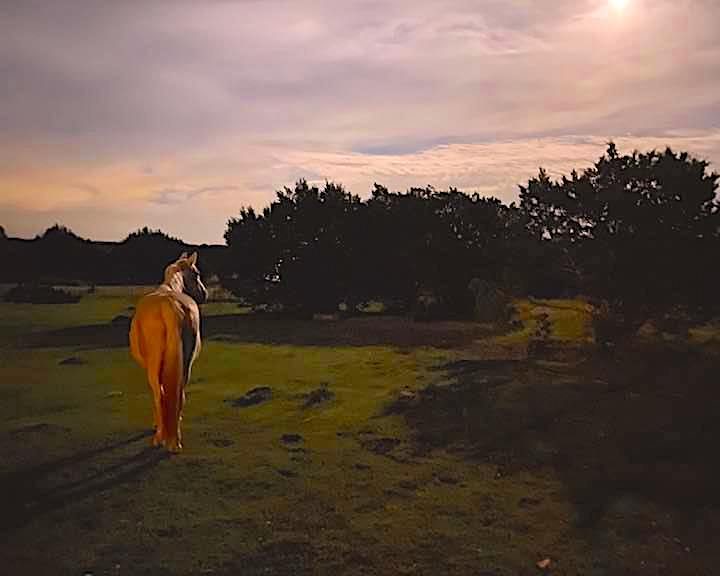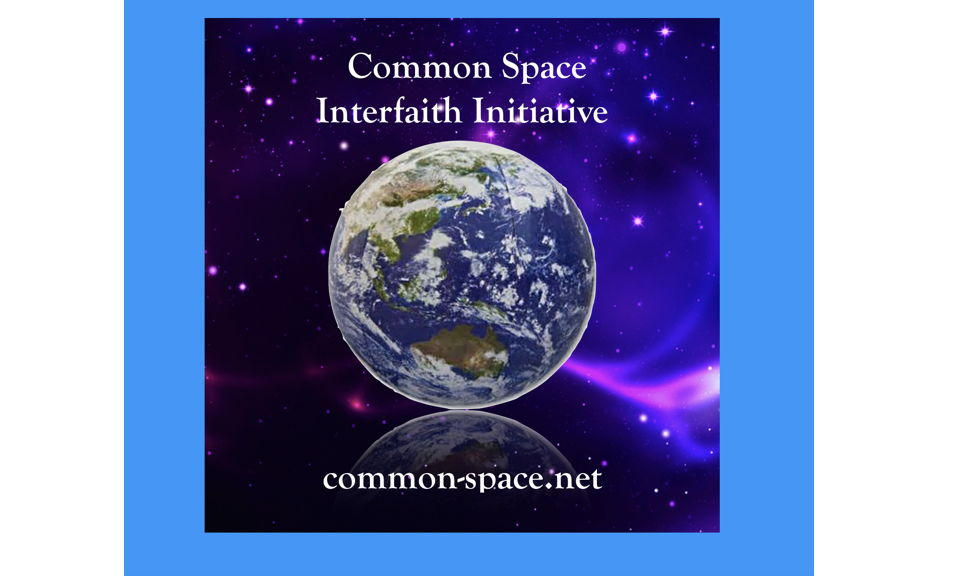Sophia stands, golden,
calf-deep on an empty beach,
feeling the insistent tide.
Brushed by silvered fish,
it may be seaweed, jaja.
Breathing salt.
Crabs have baked
in volcanic tide pools.
Molluscs cling,
urchin tendrils sway
lightly, their march
imperceptible.
They leave soundless depths
to cook on jagged rock,
and all is as should be.
Humming, fizzing white,
incanting, lifting,
circling spiral spheres.
Om aim hreem shreem
sri matre namaha
June 2022
Sorche Berry ©2022
Category Archives: Common Space Interfaith Initiative
Interspiritual Barn Chapel Initiative: Chapels in the Woods (with horses…)
This is a message I put out yesterday to anyone who would listen, asking for nature-oriented lay-monastics with barns/animals/esp. horses to consider offering interspiritual mediation space. For our purposes, “interspiritual” means across faith traditions, including no faith at all. Divisive times call for unity! Let me know what you think…And please share/broadcast if so inclined. I think our planet and our interiorities will thank us.
“As many of you know, as well as being an equine rehab instructor, I am a priest and professed lay-monastic of the Lindisfarne Community. I’m seeking the help of friends to find interspiritual ministers or lay-monastics of any tradition who may be called to offer interspiritual meditation space in a natural setting. Be grateful if you could wrack your brains and send this to the folks that occur to you–you know you know at least one! And thank you!–Sara
#barnchapelinitiative #horsesforpeace #changethemodel
“Are you an interspiritual minister or lay-monastic of any tradition with a barn and horses?
I have a few questions for you:
*Do you find yourself closest to God or Spirit, or simply Being, when in Nature?…
*Do you think these times call for Unity, Oneness, and a radical change in our relationship with Nature?…
*Does it matter to you that our barns and ag land are falling into disuse and our horses are sent to kill pens because we have no jobs for them?…
*Do you know from experience that the horse mind is good for the human mind?…
If you can say “Yes” to one or more of these questions, maybe you can say “Yes” to being part of an Interspiritual Barn Chapel Initiative! Please contact Rev Sara Berry LC at sara@sophiasgrove.org””
Contemplation Builds Community
Whatever else we do as living, breathing, walking, talking, sleeping, working members of the human race, we need to take time to share ritual space together. We’re too busy to stop and take a moment to be grateful, too stressed sometimes to stop and ask for help. Most disturbingly, we’re too busy to look over the wall of our own issues and to reach out to fellow human beings, whose issues – read nationality, customs, faith, religion – may be different from ours. Like a line in a Robert Frost poem called “Mending Wall,” we think “good fences make good neighbors.” We’re pretty comfortable with this sentiment. It validates a vaguely held impression that boundaries have their uses and it lets us off the hook of social responsibility.
Of course, some boundaries are useful.They ground us, and they provide a context within which and from which we can operate. But to see the wall and never to extend across it a hand or a smile is just plain wrong. That the two men who share a wall in Frost’s poem have a relationship at all is because they meet across it every year to fix the parts that have tumbled down, through bad weather, or damage by livestock. In fact, this time of connection is so valuable to both men that, as the poem progresses, we begin to suspect one of them may be causing some of the damage, as an excuse for company and communion. Frost’s point seems to be that boundaries are only useful when they provide an opportunity for relationship. And it is relationship that is, well, priceless.
We don’t need excuses to extend a hand; there’s damage everywhere. We’ve all made it.
So let’s share sacred space. Let’s rebuild together and repair together. But how on earth do we do this, when we pray differently, have different religious agenda, customs, and expectations? How do we bridge those kinds of divides? There is one tradition that is common to most faiths – the tradition of contemplative prayer or silent meditation. What better medium to share than silence? Silent contemplative prayer brings us to a place of absolute tranquility: a word-less, ego-less, doctrine-less haven, where we can rest, simply and fearlessly, in the sacred. Sharing silence together – across traditions and across boundaries of faith – sharing silence reaffirms that, while we may stand before gods of a different name, we stand together in our humanity, with all of its faults and all its beauty.
So find a centering prayer or meditation group near you, and try silent prayer on for size. You and your neighbor, and the things that are broken between you, will be glad you did.
Sophia’s Call
Sophia’s Call
I have never been unknown.
You have always known me.
I am Sophia of the eighth Archon,
Co-Creatrix of all the Worlds,
Lady of the Spheres,
Mistress of the Void.
If I have not been known,
That has been your choice.
You have placed a dark veil upon me,
Made me silent, forbidden.
But He knew me before Time,
Knew me well,
And He knows it is I who will
Draw down the last veil.
I am in all, your yesterdays and your forevers,
The whore and the queen, the bile and the blood,
Et Spiritus Sancti, your holy, equal third.
While I turn the constellations, I am your breath on a window,
A lost perfume, presence in an empty room,
As close to you, closer, than your faintest pulse.
I am Compassion, never-ever-ending Love.
I am poured out across a lake in sunlight,
I am the womb’s warmth; in wind, mist, moss
In fecund forest earth, a green thought.
I am mountain, ocean, leaf, and stream,
And you have always known this.
I am the swirl of dhikr,
The blessing of water,
The shoke at a wall,
Cantor, muezzin, the glistening choir.
Mother to Moses, Jesus, and Muhammad,
Always One, All in All.
These arms have held you all, and will always hold you.
I have bled with you, bled for you.
I have cried with, laughed with, and will cry again for you, my children.
I am Namu and Nous. Be held within my golden breath, radiant.
Choose to unveil me.
Many will slide or slouch away.
But for you, Soul of the World,
With Amazon stride, I will break Heaven upon you
And splintered you will scatter,
Joyous, One,
To meet the bright Abyss.
Sorche Berry ©2018
Artwork by Agnessa Kesiakova ©2018
Holding Common Space
Common Space Interfaith Initiative’s first interfaith gathering was held at St Scholastica Monastery in Boerne, Texas in 2008. The idea was, and remains to this day, to share contemplative practices between faith traditions, and this particular retreat was a sharing of Christian and Buddhist meditation practices. We had 24 Christians and one Buddhist show up–my co-presentor. We were no doubt asking for that by hosting it at a Christian monastery, go figure!
Times haven’t changed at all in terms of our ability to predict the balance of attendees from different faiths at particular events, although it strikes me that Christians may be the most existentially curious group and perhaps the most open to learning about other traditions. It’s extremely hard to find out what will call some people to want to share space with strangers from different paths, but for me it’s about creating peaceful understanding in a complicated world. As far my role as facilitator goes, I’ve stopped altogether trying to identify individual needs and now just see my role as “one who holds space.”
There seem to be three key ingredients to holding common space between faiths: the first, finding a neutral location; another, the need to co-opt a capable co-presentor from the other traditions; and lastly, the need to present a form of “safe” practice, not one potentially at odds with the belief systems of your colleagues in circle.
Thankfully, Common Space here in San Antonio no longer needs to borrow space from churches and monasteries, although I was extremely grateful for the early help. The neutral ground we have found for ourselves is in a community center which houses different non-profits, a local theater, and some other small businesses. Our meeting rooms are attached to a church, so we have the benefit of access to larger space if we need it, for presentations, visiting speakers, and so on, but the automatic association is not with Christian space. We have our own entrance and there is no religious symbolism to be seen on our route in or out.
Finding the co-presentor who is considered an authority by his or her faith colleagues in circle can be a challenge, and may take some time to finesse. However, once the right person comes your way, you stand a much better chance of gaining group members from that faith. With many potential attendees, the question is one of tradition and having the authority to speak. For instance, in a Sufi environment, Muslim attendees usually want to know the lineage of the prayer leader, to be sure they are properly authorized to lead.
Once the pragmatics of the space have been negotiated, “safe” practice become the key to having people return. The space has to be a place of comfort where attendees do not feel any risk of spiritual dissonance, including the risk of participating in a manner that goes against their belief system. Here, I’ve found the silent meditative practice of Centering Prayer particularly useful: those in circle can choose a sacred word for their practice in keeping with their tradition and we can alternate the texts used to open and close the circle between traditions.
There is so much more to say here, but I’ll follow up on these themes in later posts. Suffice to say that it is an honor to hold space between faiths, to provide that fertile liminal ground where peaceful miracles can happen. This liminal space between, however, is a fragile, delicate thing that needs to be nurtured like a wild rose: the petals can fall very fast without proper care.





